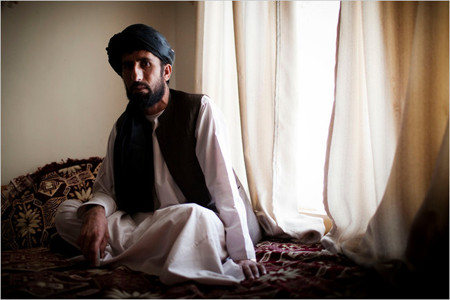By Dan Oakes
AUSTRALIA'S decision to train militiamen loyal to an Afghan warlord is senseless and harmful to the long term future of Afghanistan, experts say.

Matiullah, who has been accused of human rights violations and corruption, has worked closely with Australian and US forces in the province.(Photo: Adam Ferguson/The New York Times)
The Herald revealed last week that six men loyal to Matiullah Khan, a tribal strongman who dominates parts of Oruzgan province, had trained with Australian troops in this country. Matiullah, who has been accused of human rights violations and corruption, has worked closely with Australian and US forces in the province.
Yesterday, Bruce Haigh, a former Australian diplomat who served in Pakistan and Afghanistan, lambasted the decision to bring the militamen to Australia, on the grounds that the loyalty of Afghan irregular troops could not be guaranteed.Advertisement: Story continues below
''To think that these guys would owe some sort of loyalty to the Australians, to think Khan is in some way a good bloke, shows absolutely no understanding of Afghanistan,'' Mr Haigh said. ''I'm not being xenophobic or racist, it's just years of experience. It's a very tough country. People … live on their wits … Loyalty, of course, is a very complex thing, but it's basically to family, village and tribe.''
Mr Haigh said he was at a loss as to why the Chief of Defence Force, Angus Houston, would approve the training.
''Why does he accept this? … On what basis has he been talked into going down this path?''
An Afghanistan scholar, Amin Saikal, of the Australian National University, was also critical of the training. He said it set a bad precedent and risked entrenching Matiullah Khan as the dominant figure in the southern province, at the expense of the central government the coalition is desperately trying to prop up.
However, the head of the Australian Defence Association, Neil James, said experience showed foreign troops trained in Australia could be influenced by contact with Australian military culture.
Mr James said Indonesian and Filipino troops had been ''culturally re-engineered'' to uphold human rights and democracy in their own countries.
''The national democratisation of Indonesia and the Philippines has been largely led and partly sustained by military officers trained and educated overseas in Australia and other liberal democracies.''
Air Chief Marshal Houston has described the insurgents as well-organised and driven by a variety of grievances and motivations. In an unusually expansive speech at a conference on counter-insurgency at the Australian Defence College yesterday, Air Chief Marshal Houston urged Australian and international attendees to consider what more they could do to win Afghans over to the side of the coalition.
''The need to gain the support of the people … is fundamental to both sides,'' Air Chief Marshal Houston said. ''However, each side has different thoughts and employs different methods to achieve them. I would ask you to think what else we can or should do.''



